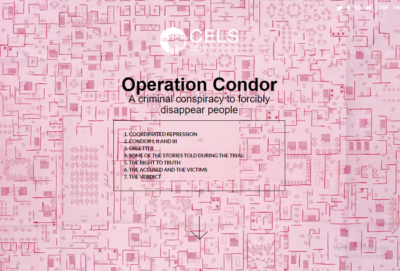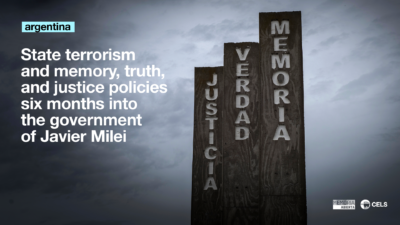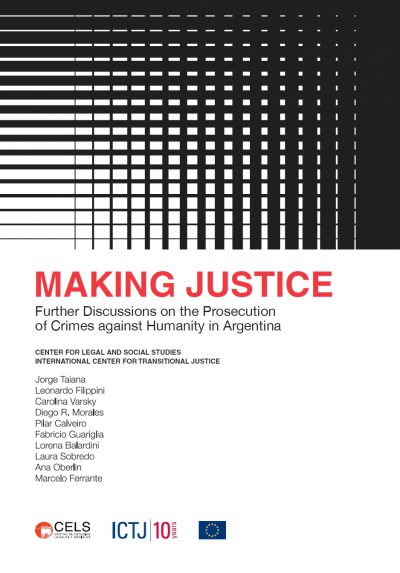
IACHR: Argentina’s government appears aggressive and ill-prepared in hearings on human rights protections
The representative from the La Libertad Avanza administration claimed poverty is decreasing but could not provide any specifics regarding social policies for children and adolescents. Nor did he address the provision of medical supplies to guarantee sexual and reproductive health. Additionally, he denied the existence of gender-based violence. During the hearing on memory policies, he attacked human rights organizations, accusing them of seeking revenge for the last military dictatorship.
Argentina must respond to the IACHR on the state of human rights
On Thursday November 14, Argentina will face three hearings where various social movements, human rights organizations and unions will present evidence of serious setbacks in public policies. The key issues raised will be memory, truth, and justice; prevention, punishment, and eradication of gender-based violence; and social and food policies.
Canceled memory: the libertarian attempt to re-legitimize the dictatorship
Autor/a: CELS & Memoria Abierta
9 pages
ver más
Milei’s administration in Argentina: A brief overview of South America’s leading far-right figure visiting Germany
Published in German on the Heinrich Böll Stiftung website.
State terrorism and memory, truth, and justice policies six months into the government of Javier Milei
Autor/a: CELS & Memoria Abierta
15 pages
ver más
100 Days of Javier Milei’s government: vindicates the dictatorship and attempts to militarize domestic security policies
Javier Milei’s government vindicates the criminal plan of the armed forces carried out during the 1970s. But it is not just an attempt to rewrite history and deny these crimes; it also aims to legitimize his policies in the present.
Democracy is improved with more democracy
In Argentina we need to collectively build a society and a political system based on respect for diversity and without violence, based on the consensus built with Nunca Más (Never Again), but we need to improve our way of life with expansion of rights always at the forefront. Joint statement with dozens of civil society organizations in our country.
2023: shaping the future of democracy with human rights
Celebrations and debates will mark the 40th anniversary of Argentina’s democracy on December 10. From CELS, we are proposing content and spaces for participation to foster the collective momentum to navigate the challenges we are facing today.
UN universal periodic review: What is Argentina’s human rights situation?
Argentina will be reviewed in the United Nations Human Rights Council on Monday, January 23. It will have to report to its peers on compliance with its international commitments on human rights matters. CELS, along with other organizations, produced reports as prior contributions for the assessment and recommendations to be produced by this mechanism. We will also be present at the session in Geneva.
Trelew Massacre: after 50 years, former marine Roberto Bravo was convicted in the U.S.
In a landmark ruling, a Miami court found Roberto Bravo guilty of the shootings of Eduardo Capello, Rubén Bonet, and Ana María Villarreal de Santucho and the attempted extrajudicial execution of Alberto Camps in August 1972. The sentence in the civil trial orders Bravo to pay USD 24 million in damages to the four plaintiff families. CELS assisted with the litigation process and accompanied the victims’ families.
Trelew massacre: after 50 years, the former marine Bravo will be tried in the United States
On June 27, the civil trial against Roberto Guillermo Bravo for his alleged responsibility in the executions will begin in Florida, United States.
CELS Regrets the Passing of Allen “Tex” Harris
Tex played a crucial role in compiling and disseminating information about Argentinian human rights violations abroad during the last civilian and military dictatorship.
Mercedes-Benz: Kidnapping and torture to drown out workers’ demands
Seven company workers who were kidnapped in the 1970s – six of whom remain disappeared – and whose cases are analyzed in this trial were labor activists and delegates to the internal trade-union commission at Mercedes-Benz. CELS is acting as a plaintiff in its capacity as a human rights organization.
Supreme Court rules the “2 for 1” benefit is not applicable to crimes against humanity
The high court ruled on the case of Rufino Batalla, convicted to 13 years in prison for the kidnapping, torture and murder of Laura Carlotto and Olga Noemí Casado, and who had requested that the “2 for 1” sentence reduction provision be applied to his case. By determining it was inapplicable, the Supreme Court modified the criteria it had utilized in the Muiña ruling, which prompted widespread repudiation and led to the approval of a new law.
Beristain: “Reparation must be attuned to the needs of victims”
When victims of human rights violations or their relatives seek justice, it is fundamental that they have psychological support. Organizations from the region that do such psycholegal work met in Buenos Aires to exchange strategies.
“Sheraton” trial: Our pleadings on behalf of Ana María Caruso and Roberto Carri
Ana María and Roberto were abducted in Morón, a suburb of Buenos Aires, and taken to the clandestine detention center known as the Sheraton or Embudo. For the couple’s kidnapping and torture, we ask that the court sentence the four defendants to 25 years in prison. At the trial, CELS represents their daughters, Andrea, Paula and Albertina Carri.
La Fronterita sugar company: six businessmen will be questioned over crimes against humanity
The public prosecutor’s office will question sugar industry executives from the province of Tucumán about their collaboration with the crimes committed against 68 people. Eleven of the victims remain disappeared.
Peru: Fujimori’s pardon violates international and inter-American standards
FIDH, CELS and Abuelas de Plaza de Mayo present an amicus curiae brief before the Inter-American Court of Human Rights, demonstrating the incompatibility of the pardon granted to former Peruvian President Alberto Fujimori with international and inter-American human rights standards.
Human Rights in Argentina: Our 2017 report in broad strokes
Argentina is known globally for its hard-fought Memory, Truth and Justice process over the crimes committed during the 1976-1983 dictatorship. But numerous other human rights achievements have been enshrined in the country’s constitution, laws, regulations and jurisprudence over the years. Today, some of those are at risk.
ESMA trial: The “death flights” were proven in court
After a trial lasting five years, the case known as ESMA III ended with 29 life imprisonment convictions, 19 sentences of between 8 and 25 years in prison, and 6 acquittals.
IACHR session: Memory, truth and justice, labor rights, Milagro Sala and Lhaka Honhat
Next week the Inter-American Commission on Human Rights (IACHR) will hold its 165th session in Montevideo. CELS will participate with other organizations in two public hearings and two work meetings with representatives of the IACHR and the Argentine state.
The Argentine state will be evaluated at the UN
National organizations presented their assessments for the Universal Periodic Review (UPR), a peer evaluation of the human rights situation in each of the UN’s 193 member states. Argentina will be evaluated in early November.
Civilian responsibility: First conviction of a businessman on crimes against humanity revoked
A federal appeals court overturned the convictions of businessman Marcos Levín and three police officers, disregarding the context of worker persecution that existed in the 1970s and was evident in the case of Levín’s company, La Veloz del Norte. It also failed to acknowledge civilian and corporate complicity with the dictatorship and questioned the numerous witnesses who told of Levín’s presence at the place where torture was carried out.
“ABO” detention centers: convictions requested for crimes against 352 people
The crimes attributed to the nine defendants were proven over the course of the trial, according to plaintiffs. For the first time, information was brought to light regarding the “transfer”-murder of 14 people held captive in this circuit of clandestine detention centers.
Four people convicted of crimes against humanity at Orletti detention center
More than 300 people were detained in the Automotores Orletti clandestine detention center, which functioned in a Buenos Aires mechanics’ shop in 1976. The majority were kidnapped as part of Operation Condor, a criminal conspiracy to persecute and disappear people across international borders.
The Supreme Court must say No to the “2 for 1” decision
Campaign by human rights organizations so that the Argentine Supreme Court issues a new ruling rolling back its decision that benefited perpetrators of crimes against humanity.
Automotores Orletti trial: pleadings come to a close with request for sentences
Today was the second and final hearing of the plaintiffs’ pleadings in the trial over crimes committed in the Orletti clandestine detention center. Two murders had never been brought to light during a trial before and, for the first time, these defendants are being held to account for their actions under state terrorism. We requested that three of them be sentenced to life in prison.
Argentines, again, resoundingly reject impunity for crimes against humanity
Some half a million people took to the streets in Buenos Aires alone to reject a Supreme Court decision aimed at dramatically reducing prison terms for perpetrators of crimes against humanity during the last dictatorship.
Argentine state faces UN Committee Against Torture
The Argentine state’s compliance with the Convention against Torture will be evaluated on Wednesday, April 26 and Thursday, April 27. CELS submitted a report to the UN Committee that carries out the evaluation and contributed to two reports produced with other organizations.
Rodolfo Walsh: 40 years after his disappearance
The day after writing his “Open letter to the Military Junta,” Walsh was ambushed by ESMA agents.
Corporate responsibility in crimes against humanity: Personal reflections
Victorio Paulón, a metalworker and union leader who was detained during Argentina’s 1976-1983 dictatorship, discusses judicial reluctance to prosecute corporate responsibility for the crimes against humanity committed under state terrorism.
Business and human rights: Latin American contributions to debates on an international treaty
The United Nations intergovernmental working group in charge of designing the treaty met in Geneva.
A new trial against Automotores Orletti gets underway
Prosecution will continue over the crimes against humanity committed at Automotores Orletti, the clandestine detention center where many victims of Operation Condor were held illegally.
Trial for crimes committed in the Atlético-Banco-Olimpo detention centers begins tomorrow
This is the third trial for the crimes against humanity committed in the “ABO” circuit of clandestine detention centers, which were used for two years starting in early 1977.
For the first time a court rules that Operation Condor was a criminal conspiracy
The existence of a formal system of repressive coordination between the dictatorships of Argentina, Bolivia, Brazil, Chile, Paraguay and Uruguay was proven in court.

ESMA: CELS requested prison terms for 55 defendants
CELS, on behalf of the unified legal team representing plaintiffs, requested life in prison for 51 defendants and 10-to-25-year prison terms for four others, in the third trial over the crimes against humanity committed at the ESMA torture and detention center.
New research: Business responsibility in crimes against humanity in Argentina
The report “Business responsibility in crimes against humanity: The repression of workers during state terrorism” presents evidence confirming that the owners, executives and managers of some companies actively participated in violating the human rights of workers during Argentina’s last dictatorship (1976-1983).
Making Justice: Further Discussions on the Prosecution of Crimes against Humanity in Argentina
Autor/a: Center for Legal and Social Studies (CELS) and International Center for Transitional Justice (ICTJ)
164 pgs.
ver más





